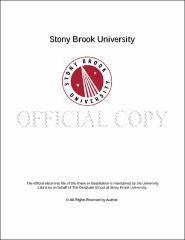| dc.identifier.uri | http://hdl.handle.net/11401/76807 | |
| dc.description.sponsorship | This work is sponsored by the Stony Brook University Graduate School in compliance with the requirements for completion of degree. | en_US |
| dc.format | Monograph | |
| dc.format.medium | Electronic Resource | en_US |
| dc.language.iso | en_US | |
| dc.publisher | The Graduate School, Stony Brook University: Stony Brook, NY. | |
| dc.type | Dissertation | |
| dcterms.abstract | Formation of modern states has been studied by numerous scholars over the last four decades however, the particular role of urbanization in this process have received considerably less attention. The few existing works that do focus on this issue exclusively examine the European experience and explain the interaction between cities and emerging states within that historical framework. This dissertation examines socio-political dynamics of urbanization and urbanism in the Turko-Persian geography during the establishment of modern nation-states in order to identify the ways, in which the dynamics affected the ensuing state-society relations. For this purpose I conducted a comparative historical analysis of four countries that differ with respect to state power, while having comparable structures of urbanization. In Iran and Turkey modern states have consolidated territorial control and unified the society under their hegemony, whereas the in Afghanistan and Pakistan they have failed albeit at different levels. Meanwhile, during early years of state formation Iran and Afghanistan had similar patterns of urbanization, while those of Turkey and Pakistan ran parallel. By examining the information collected from secondary sources I argue that the relation between urbanization and state formation is variable and operates on three levels; cities can enhance or reduce governments’ economic power, they can function as means of ideological dissemination or as settings for opposition mobilization, and cities can support states territorial control or function as a confinement for political power. The matrix of rulers’ political choices and existing urban structure determine the effect cities have over state power at each level -economic, ideological, and spatial. Consequently this study challenges the one-dimensional relationship between cities and states put forward in the existing literature, and questions the applicability of European historical experience as the basis of an overarching theory regarding the function of urbanization within the process of political domination. | |
| dcterms.abstract | Formation of modern states has been studied by numerous scholars over the last four decades however, the particular role of urbanization in this process have received considerably less attention. The few existing works that do focus on this issue exclusively examine the European experience and explain the interaction between cities and emerging states within that historical framework. This dissertation examines socio-political dynamics of urbanization and urbanism in the Turko-Persian geography during the establishment of modern nation-states in order to identify the ways, in which the dynamics affected the ensuing state-society relations. For this purpose I conducted a comparative historical analysis of four countries that differ with respect to state power, while having comparable structures of urbanization. In Iran and Turkey modern states have consolidated territorial control and unified the society under their hegemony, whereas the in Afghanistan and Pakistan they have failed albeit at different levels. Meanwhile, during early years of state formation Iran and Afghanistan had similar patterns of urbanization, while those of Turkey and Pakistan ran parallel. By examining the information collected from secondary sources I argue that the relation between urbanization and state formation is variable and operates on three levels; cities can enhance or reduce governments’ economic power, they can function as means of ideological dissemination or as settings for opposition mobilization, and cities can support states territorial control or function as a confinement for political power. The matrix of rulers’ political choices and existing urban structure determine the effect cities have over state power at each level -economic, ideological, and spatial. Consequently this study challenges the one-dimensional relationship between cities and states put forward in the existing literature, and questions the applicability of European historical experience as the basis of an overarching theory regarding the function of urbanization within the process of political domination. | |
| dcterms.available | 2017-09-20T16:51:13Z | |
| dcterms.contributor | Levy, Daniel | en_US |
| dcterms.contributor | Arjomand, Said A. | en_US |
| dcterms.contributor | Roxborough, Ian | en_US |
| dcterms.contributor | Sohrabi, Nader. | en_US |
| dcterms.creator | Ersoy, Can | |
| dcterms.dateAccepted | 2017-09-20T16:51:13Z | |
| dcterms.dateSubmitted | 2017-09-20T16:51:13Z | |
| dcterms.description | Department of Sociology | en_US |
| dcterms.extent | 213 pg. | en_US |
| dcterms.format | Monograph | |
| dcterms.format | Application/PDF | en_US |
| dcterms.identifier | http://hdl.handle.net/11401/76807 | |
| dcterms.issued | 2016-12-01 | |
| dcterms.language | en_US | |
| dcterms.provenance | Made available in DSpace on 2017-09-20T16:51:13Z (GMT). No. of bitstreams: 1
Ersoy_grad.sunysb_0771E_12715.pdf: 1442012 bytes, checksum: 35710392bb8c2e40520c550b467a472a (MD5)
Previous issue date: 1 | en |
| dcterms.publisher | The Graduate School, Stony Brook University: Stony Brook, NY. | |
| dcterms.subject | Sociology -- History | |
| dcterms.subject | Afghanistan, Iran, Pakistan, state formation, Turkey, urbanization | |
| dcterms.title | Urbanization and the Formation of Modern Nation-States in the Turko-Persian World | |
| dcterms.type | Dissertation | |

